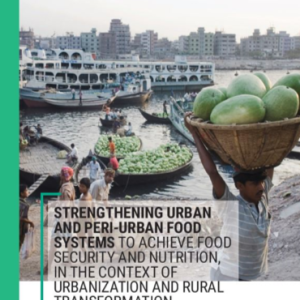
This report by the High Level Panel of Experts on Food Security and Nutrition (HLPE-FSN) calls for the strengthening of urban and peri-urban food systems amidst rapidly expanding urbanisation and rural transformation. It provides detailed and context specific policy recommendations to improve food security and nutrition and is guided by the principles of the right to food and the right to the city.
Summary
This report by the High Level Panel of Experts on Food Security and Nutrition (HLPE-FSN) explores urban and peri-urban food systems and challenges previous narratives on where the world’s most food-insecure populations live. The analysis shows that over three-quarters of the world’s food-insecure population lives in urban and peri-urban regions. It also explores the topic of the right to food, or the human right to have permanent and unrestricted access to healthy and culturally appropriate food. The authors of the report aim to support policymakers, researchers and other actors interested in ensuring food security and nutrition within the context of rapid urbanisation and rural transformation.
The authors of the report argue that national food security and food system policies have largely neglected urban and peri-urban food security and nutrition. They have also left the role of local governments out of discussions related to how food systems are shaped and the policies of food security and nutrition outcomes. This report seeks to fill these gaps with detailed policy recommendations.
The report has several objectives: identify the main bottlenecks preventing food security and nutrition in urban and peri-urban areas, connect these food systems issues to other relevant problems such as water, energy and mobility, explore how urban and peri-urban food systems can be transformed from their current status towards a more equitable, accessible, sustainable and resilient state, and provide policy recommendations that can be used by policymakers to address these issues in a variety of contexts.
The report examines the importance of maintaining food system diversity, meaning protecting and restoring the traditional and informal components of the food system. The authors argue this can be especially useful in developing and sustaining resilient food systems that increase food security and improve nutrition.
The report builds policy recommendations from a theory of change which can be seen in Figure 1.
Figure 1: Theory of change for improved urban and peri-urban food security and nutrition
The report’s theory of change to improve urban and peri-urban food security and nutrition has five key drivers informed by the principles of the right to food and the right to the city. The authors note it is inevitably context specific and will require various forms of data and research. The authors explain that the right to food and the right to the city principles should guide policy. This would mean that policy recognises interrelated, interconnected and indivisible human rights; recognises the obligations of states, local authorities and the private sector and the rights and responsibilities of civil society; implements human rights, specifically the right to food, in order to transform urban and peri-urban food systems at the local level; and integrates human rights‑based approaches in city-level governance like statutes, planning and programmatic documents.
The chapter topics and the structure of the report can be seen in Figure 2
Figure 2: Report structure with eight chapter descriptions.
Read more here. See also the TABLE explainer What is the land sparing-sharing continuum?







Post a new comment »